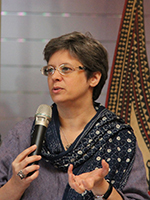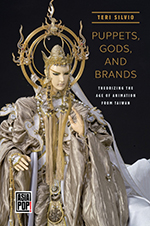"Taiwanese Puppetry Cosplay: Negotiating Performance and Animation"
In the twenty-first century, the Japanese manga and anime industry has opened markets around the world. As manga and anime have spread, so too has the fan practice of cosplay, dressing up as animated characters. The vast majority of cosplayers around the world are women. In this paper, I examine the practice of cosplay in Taiwan, and in particular, cosplayers who dress as characters from a unique Taiwanese genre of animation, “digital video swordplay puppetry.”
There is a continuum of how cosplayers think and talk about cosplay. Some cosplayers, especially in North America, see cosplaying as a kind of acting and say they want to “become the character.” Others, especially in Asia, see cosplay more in terms of bringing puppet characters to life, (re)animating them. I argue that cosplay appeals primarily to women because it is a pleasurable play form of the kinds of work that they are expected to do at their jobs and in their social lives. Cosplay allows women to experiment with different ways of blending embodied and disembodied, performative and animating, forms of affective labor.
Teri Silvio is a Research Fellow at the Institute of Ethnology, Academia Sinica, Taiwan. She is an anthropologist who has done extended ethnographic research on theater, puppetry, toy design, and comics. Her work combines approaches from anthropology, cultural studies, gender and sexuality studies, performance studies, and media studies. Her book, Puppets, Gods, and Brands: Theorizing the Age of Animation from Taiwan (University of Hawai`i Press 2019) develops an anthropological concept of animation as a complement to the concept of performance, and elaborates this concept through Taiwanese examples including televised puppetry, folk religious practice, and manga/anime fandom.
This event is co-sponsored with the department of East Asian Languages and Cultures, and the Taiwan Ministry of Education.


